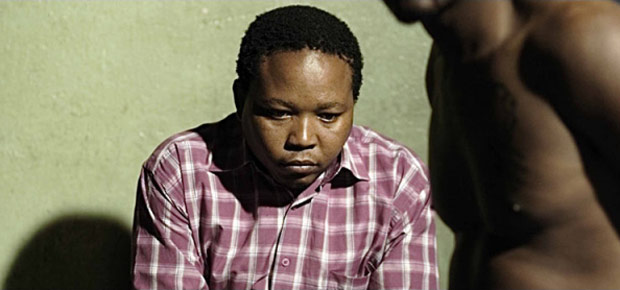
What it's about:
When the wife of a successful black businessman with roots in the struggle against apartheid is murdered by a young stranger who knows his name, he has to go back into his own past to find the answers that will lead him to the killer. But when he finds him and the reasons for the murder, will vengeance still be possible?
What we thought:
Documentary filmmaker Khalo Matabane’s debut feature film, State of Violence, is an exploration of our nation and its predilection for violence.
The murder that sets the protagonist, Bobedi (Fana Mokoena), on his journey of self-discovery is excruciating to watch. It is a scene that plays out daily in homes across our country – home invasion and senseless blood-letting. From the outset, everyone in the audience will know versions of these characters.
Bobedi is a businessman in noughties South Africa who can eat sushi off as many women as he likes, but this former struggle hero soon learns the limitations of money when his wife is brutally killed. As the investigation into her murder stalls, Bobedi decides to do a little private sleuthing.
To do this, he heads home to Alexandra to get help from his stay-at-home brother, Boy-Boy (Presley Chweneyagae). Chweneyagae gives a performance worthy of his Tsotsi days as the antithesis of Bobedi’s character, but Mary Twala as the pair’s disapproving mother is mesmerising. She has little sympathy for her eldest son’s plight, which strikes the audience as odd.
But as the story unfolds, her attitude is explained because Bobedi’s first act of familial betrayal wasn’t moving to Sandton. It dates back to the days of the struggle.
Matabane cleverly links the violence of the past with that of the present, following the thread to discover what it is that creates a killer. Unfortunately, even though the story offers a chance for forgiveness and redemption, it feels as though it is the exception rather than the rule.
Matabane’s documentary eye stands him in good stead – he managed to shoot this film in a measly 30 days.
In keeping with his tiny budget, most of those days were spent on location in Alexandra, which, he told me in an interview when the film opened at the Durban International Film Festival last year, is a place that doesn’t need any art direction.
Much of State of Violence deals with memory and how we remember things, or rather how we forget or rewrite parts of history to suit our particular worldview. It is also about contrasts – the most obvious of these being between Sandton and Alexander, neighbours only in geography.
All in all, the film is relevant to South Africans from all walks of life. Many may find staying in their seats uncomfortable, but that’s what makes the film worthy in the first place.
When the wife of a successful black businessman with roots in the struggle against apartheid is murdered by a young stranger who knows his name, he has to go back into his own past to find the answers that will lead him to the killer. But when he finds him and the reasons for the murder, will vengeance still be possible?
What we thought:
Documentary filmmaker Khalo Matabane’s debut feature film, State of Violence, is an exploration of our nation and its predilection for violence.
The murder that sets the protagonist, Bobedi (Fana Mokoena), on his journey of self-discovery is excruciating to watch. It is a scene that plays out daily in homes across our country – home invasion and senseless blood-letting. From the outset, everyone in the audience will know versions of these characters.
Bobedi is a businessman in noughties South Africa who can eat sushi off as many women as he likes, but this former struggle hero soon learns the limitations of money when his wife is brutally killed. As the investigation into her murder stalls, Bobedi decides to do a little private sleuthing.
To do this, he heads home to Alexandra to get help from his stay-at-home brother, Boy-Boy (Presley Chweneyagae). Chweneyagae gives a performance worthy of his Tsotsi days as the antithesis of Bobedi’s character, but Mary Twala as the pair’s disapproving mother is mesmerising. She has little sympathy for her eldest son’s plight, which strikes the audience as odd.
But as the story unfolds, her attitude is explained because Bobedi’s first act of familial betrayal wasn’t moving to Sandton. It dates back to the days of the struggle.
Matabane cleverly links the violence of the past with that of the present, following the thread to discover what it is that creates a killer. Unfortunately, even though the story offers a chance for forgiveness and redemption, it feels as though it is the exception rather than the rule.
Matabane’s documentary eye stands him in good stead – he managed to shoot this film in a measly 30 days.
In keeping with his tiny budget, most of those days were spent on location in Alexandra, which, he told me in an interview when the film opened at the Durban International Film Festival last year, is a place that doesn’t need any art direction.
Much of State of Violence deals with memory and how we remember things, or rather how we forget or rewrite parts of history to suit our particular worldview. It is also about contrasts – the most obvious of these being between Sandton and Alexander, neighbours only in geography.
All in all, the film is relevant to South Africans from all walks of life. Many may find staying in their seats uncomfortable, but that’s what makes the film worthy in the first place.




 Publications
Publications
 Partners
Partners















